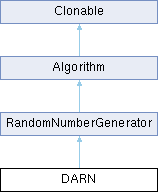Hardware generated random numbers using DARN instruction. More...
 Inheritance diagram for DARN:
Inheritance diagram for DARN:Public Member Functions | |
| DARN () | |
| Construct a DARN generator. More... | |
| virtual void | GenerateBlock (byte *output, size_t size) |
| Generate random array of bytes. More... | |
| virtual void | DiscardBytes (size_t n) |
| Generate and discard n bytes. More... | |
| virtual void | IncorporateEntropy (const byte *input, size_t length) |
| Update RNG state with additional unpredictable values. More... | |
| std::string | AlgorithmProvider () const |
| Retrieve the provider of this algorithm. More... | |
 Public Member Functions inherited from RandomNumberGenerator Public Member Functions inherited from RandomNumberGenerator | |
| virtual bool | CanIncorporateEntropy () const |
| Determines if a generator can accept additional entropy. More... | |
| virtual byte | GenerateByte () |
| Generate new random byte and return it. More... | |
| virtual unsigned int | GenerateBit () |
| Generate new random bit and return it. More... | |
| virtual word32 | GenerateWord32 (word32 min=0, word32 max=0xffffffffUL) |
| Generate a random 32 bit word in the range min to max, inclusive. More... | |
| virtual void | GenerateIntoBufferedTransformation (BufferedTransformation &target, const std::string &channel, lword length) |
| Generate random bytes into a BufferedTransformation. More... | |
| template<class IT > | |
| void | Shuffle (IT begin, IT end) |
| Randomly shuffle the specified array. More... | |
 Public Member Functions inherited from Algorithm Public Member Functions inherited from Algorithm | |
| Algorithm (bool checkSelfTestStatus=true) | |
| Interface for all crypto algorithms. More... | |
| virtual std::string | AlgorithmName () const |
| Provides the name of this algorithm. More... | |
 Public Member Functions inherited from Clonable Public Member Functions inherited from Clonable | |
| virtual Clonable * | Clone () const |
| Copies this object. More... | |
Static Public Member Functions | |
| static const char * | StaticAlgorithmName () |
Detailed Description
Hardware generated random numbers using DARN instruction.
DARN() provides access to Power9's random number generator. The Crypto++ implementation provides conditioned random numbers from the generator as opposed to raw random numbers. According to Power ISA 3.0B manual, a conditioned random number has been processed by hardware to reduce bias. A raw random number is unconditioned noise source output.
According to Power ISA 3.0B manual, the random number generator provided by the darn instruction is NIST SP800-90B and SP800-90C compliant to the extent possible given the completeness of the standards at the time the hardware is designed. The random number generator provides a minimum of 0.5 bits of entropy per bit.
- Wraps
- darn instruction
- See also
- Power ISA Version 3.0B, MaurerRandomnessTest() for random bit generators
- Since
- Crypto++ 8.0
Constructor & Destructor Documentation
◆ DARN()
| DARN::DARN | ( | ) |
Member Function Documentation
◆ GenerateBlock()
|
virtual |
Generate random array of bytes.
- Parameters
-
output the byte buffer size the length of the buffer, in bytes
Reimplemented from RandomNumberGenerator.
◆ DiscardBytes()
|
virtual |
Generate and discard n bytes.
- Parameters
-
n the number of bytes to generate and discard
the RDSEED generator discards words, not bytes. If n is not a multiple of a machine word, then it is rounded up to that size.
Reimplemented from RandomNumberGenerator.
◆ IncorporateEntropy()
|
inlinevirtual |
Update RNG state with additional unpredictable values.
- Parameters
-
input unused length unused
The operation is a nop for this generator.
Reimplemented from RandomNumberGenerator.
◆ AlgorithmProvider()
|
inlinevirtual |
Retrieve the provider of this algorithm.
- Returns
- the algorithm provider
The algorithm provider can be a name like "C++", "SSE", "NEON", "AESNI", "ARMv8" and "Power8". C++ is standard C++ code. Other labels, like SSE, usually indicate a specialized implementation using instructions from a higher instruction set architecture (ISA). Future labels may include external hardware like a hardware security module (HSM).
Generally speaking Wei Dai's original IA-32 ASM code falls under "SSE2". Labels like "SSSE3" and "SSE4.1" follow after Wei's code and use intrinsics instead of ASM.
Algorithms which combine different instructions or ISAs provide the dominant one. For example on x86 AES/GCM returns "AESNI" rather than "CLMUL" or "AES+SSE4.1" or "AES+CLMUL" or "AES+SSE4.1+CLMUL".
- Note
- Provider is not universally implemented yet.
- Since
- Crypto++ 8.0
Reimplemented from Algorithm.
The documentation for this class was generated from the following files:
